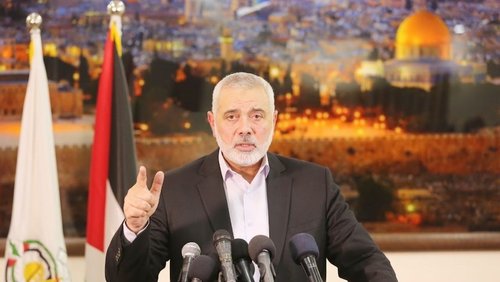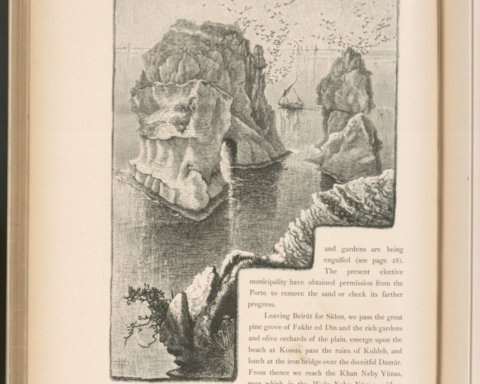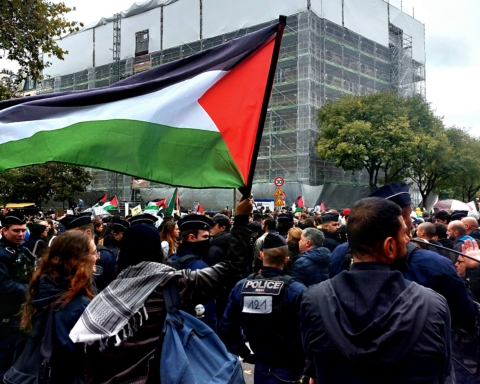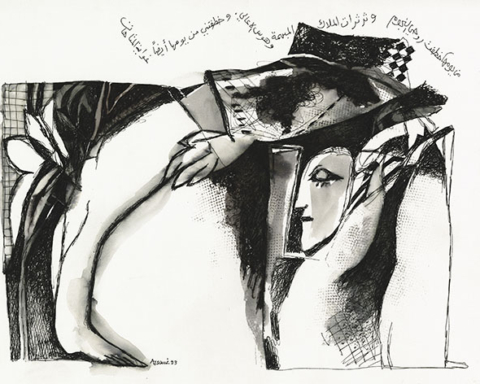En exil aux USA, Souhail Chichah enseigne au Williams College. Ses recherches actuelles portent sur la théorie du capital, l’anthropologie de la blanchité ainsi que sur la généalogie du racisme. Son poème intitulé “Prendre langue” a été nominé par le concours européen d’écriture “Parler l’Europe en des langues différentes”. L’une de ses publications récentes, intitulée “ ’L’islamisation de la France’ : acteurs et ressorts d’une dangereuse rengaine”, co-écrite avec François Burgat, vient d’être publiée par la revue Jadaliyya.
L’analyse, par la sociologue Nouria Ouali (Université Libre de Bruxelles), du “traitement d’exception” réservé à Souhail Chichah”révèle le processus de criminalisation et de diabolisation” ainsi que “la violence institutionnelle, politique, intellectuelle et médiatique sans précédent” en Belgique, dont il a fait l’objet. Il a également été la cible “de réactions politiques unanimes et musclées allant de la condamnation morale aux intimidations politico-judiciaires et à l’éviction” de son emploi de chercheur à l’Université Libre de Bruxelles.
“J’ai cherché non pas à rire des actions humaines, ni à pleurer à leur sujet, ni à les haïr, mais à les comprendre.” – Spinoza
L’attaque militaire menée par le Hamas est actuellement le cadrage “occidental” dominant de la question israélo-palestinienne.
Le Président des États-Unis a présenté ses condoléances aux familles israéliennes qui ont subi des pertes, tout en négligeant ostensiblement d’exprimer des sentiments similaires aux familles palestiniennes, et ce en plein bombardement aérien intensif de Gaza. Parallèlement, les États-Unis ont envoyé des moyens militaires navals et aériens dans la région, démontrant une fois de plus leur soutien marqué à Israël.
De manière similaire, le Royaume-Uni s’apprête à envoyer deux navires de la Royal Navy en conjonction avec des moyens de surveillance aérienne en Méditerranée orientale, dans le cadre d’une initiative visant à renforcer l’architecture du pouvoir dans la région.
Les actions létales du Hamas ont suscité de nombreuses condamnations de la part des dirigeants européens. Dénonçant cette organisation politique, la Présidente de la Commission, Ursula von der Leyen, a souligné “le droit d’Israël à l’autodéfense”. La Commission européenne a annoncé un “examen urgent de l’aide de l’Union européenne à la Palestine”, alors que quelques heures plus tôt l’un de ses commissaires, Oliver Varhelyi, avait annoncé la suspension de tous les paiements prévus dans le cadre de cette aide au développement.
La condamnation du Hamas pour le meurtre de civils israéliens soulève également des questions parmi les sympathisants de la cause palestinienne. Si la condamnation du Hamas par “l’Occident” est fondée sur son rejet de l’islam politique, ce n’est pas nécessairement le cas pour de nombreux critiques de l’occupation israélienne. C’est ainsi au nom du rejet d’une double norme éthique et morale que ces derniers s’inscrivent dans la perspective “occidentale”, centrée sur la violation par le Hamas de la Convention de Genève.
“Ces gens du Hamas sont des bêtes humaines” — Prix Nobel Shimon Peres.
Le ministre israélien de la Défense, Yoav Gallant, vient de décrire le conflit en termes de déshumanisation flagrante, le caractérisant comme une “lutte contre des animaux humains”.
Cette déclaration fait écho à la caractérisation des Arabes comme “bêtes sauvages” par le Premier ministre israélien Benjamin Netanyahu, contribuant ainsi à un discours de déshumanisation des Palestiniens.
Shimon Peres, lauréat du prix Nobel de la paix en 1994 et ancien président israélien, a joué un rôle dans la formation de la rhétorique qui représente les Palestiniens comme inhumains, un récit profondément ancré en Israël. Il y a près de 15 ans déjà, il qualifiait les membres du Hamas de “bêtes humaines”. Cette déclaration, publiée dans un grand journal de Bruxelles en 2009, n’a suscité aucune réaction significative. Au contraire, il reçoit un prix doctor honoris de l’Université Libre de Bruxelles quelques années plus tard.
Il convient de noter qu’en “Occident”, bien que la diabolisation du Hamas soit unanime, sa perspective est largement ignorée. C’est une condamnation de principe. Cependant, le manque de compréhension de la rationalité politique d’un acteur clé de la question israélo-palestinienne empêche le lancement ou le soutien à des négociations politiques qui n’impliquent pas l’humiliation, semant ainsi les graines de la perpétuation de la violence.
Les accords d’Oslo servent aujourd’hui d’illustration poignante de cette réalité. Initialement, il y avait un espoir généralisé qu’ils ouvriraient la voie à une solution à deux États, mettant fin à la violence et aux tensions prolongées dans la région. Cependant, au fil des ans, la mise en œuvre de l’accord d’Oslo a rencontré d’énormes obstacles, notamment l’expansion des colonies, le manque de pleine souveraineté pour les Palestiniens et des questions non résolues sur le statut de Jérusalem, entre autres. Par conséquent, l’optimisme autrefois enthousiaste entourant les accords s’est progressivement estompé jusqu’à s’éteindre.
Comprendre le Hamas est donc nécessaire pour parvenir à un accord sur les modalités de la négociation, une condition préalable à la négociation elle-même.
Alors que l’opinion “occidentale” considère les Israéliens comme des civils, le Hamas, parmi de nombreux autres Palestiniens, les considère, en particulier ceux de la Cisjordanie occupée, comme des colons perçus comme “part du pouvoir militaire israélien”.
La deuxième justification fournie par le Hamas est qu’ils répondent eux-mêmes à des violations des lois internationales commises par Israël et dénoncent la double norme de l’indignation que ces violations suscitent.
À qui appartient le droit international ?
La distinction entre civils et colons n’est pas seulement terminologique, mais elle est imprégnée de considérations éthiques, juridiques et politiques. Elle exige une analyse herméneutique qui tienne compte non seulement des textes juridiques, mais aussi du contexte socio-politique et des interprétations mutables des normes juridiques internationales.
Avant d’aller plus loin, il est impératif de souligner que l’interrelation profonde entre la société civile israélienne et son infrastructure militaire a suscité l’attention d’un large éventail d’intellectuels israéliens. Parmi ces penseurs, le célèbre chroniqueur israélien Gideon Levy se distingue comme un commentateur notable sur ce sujet.
En ce qui concerne l’argument initial du Hamas, qui affirme que les Israéliens devraient être catégorisés comme des colons plutôt que comme des civils, le droit international fournit un ensemble nuancé de critères pour distinguer les deux groupes, notamment dans un contexte d’occupation et de conflit.
Les colons – en tant que civils – sont généralement protégés contre les actions militaires directes en vertu du droit humanitaire international (DHI). Cependant, la profondeur de l’occupation et l’illégalité des colonies, ainsi que bien sûr les participations directes aux hostilités, introduisent des nuances qui affectent l’application de ces protections.
De plus, alors que la communauté internationale considère principalement les colonies comme illégales, les autorités israéliennes les considèrent comme légales en vertu de leur droit national.
Cela soulève des questions éthiques et juridiques sur la question de savoir si les colons doivent être considérés comme des personnes protégées en vertu du DHI ou comme des participants volontaires à une activité illégale.
Par ailleurs, en ce qui concerne les graves violations des Conventions de Genève et du droit humanitaire international, le consensus juridique international penche largement en faveur de la non-prescription, ce qui rend la question posée par le Hamas d’autant plus complexe : de 1948 à nos jours, quelle frontière doit être considérée pour distinguer les colons des civils ?
Le Hamas pose une question fondamentale qui dévoile le tissu historique complexe de la région, s’étendant de la Nakba et de la création d’Israël aux événements actuels. Cette interrogation exige plus qu’une simple reconnaissance ; elle exige une délibération substantielle et engagée en vue d’une résolution négociée. Étant donnée la gravité existentielle qu’elle représente pour la région et ses implications saillantes pour la stabilité mondiale, l’apathie ou la négligence persistante des puissances “occidentales” a atteint un point d’insoutenabilité.
En ce qui concerne le deuxième point soulevé par le Hamas, qui concerne la question de savoir s’il doit adhérer au droit international qui reste ignoré lorsqu’il intervient en faveur de la Palestine, il incombe principalement aux États-Unis d’initier un changement de paradigme.
Le doigt ou la lune ?
Comme Derrida nous le rappelle si justement, tout est une question de cadrage. C’est également un principe de la propagande de guerre.
Par conséquent, nous devons refuser tout réductionnisme dans l’approche de la question israélo-palestinienne et restaurer toute sa complexité : elle ne peut être réduite, résumée ou même centrée uniquement sur le Hamas pour l’analyse.
À l’échelle mondiale, des diplomates d’une centaine de nations ont présenté diverses réponses à la confrontation armée actuelle. Moins de la moitié de ces nations ont ouvertement condamné le Hamas. À l’inverse, d’autres, y compris des acteurs régionaux comme le Qatar, l’Arabie saoudite, le Koweït, la Syrie et l’Irak, ont attribué la responsabilité des hostilités à Israël. Environ vingt nations ont régulièrement défendu le droit d’Israël à l’autodéfense, tandis que d’autres acteurs ont plaidé pour une rapide désescalade de la destruction [1] de Gaza.
Les faits parlent d’eux-mêmes ; la question israélo-palestinienne est une question mondiale. Elle divise le monde : pour certains, un symbole du colonialisme et de l’impérialisme américain ; pour d’autres, une réparation pour le passé fasciste européen et un porte-étendard de la démocratie. C’était le cas bien avant la formation du Hamas.
Quant à ce dernier, une voix importante parmi d’autres voix tout aussi importantes du peuple palestinien, il est nécessaire de l’humaniser pour le comprendre. Contrairement à ce que prétend le Prix Nobel Shimon Peres, le Hamas ne devrait plus être considéré comme une “bête”. Tout acteur politique a une rationalité ; refuser d’écouter cette rationalité, ce n’est rien moins que refuser la Politique. Autrement dit, pousser à la violence armée dans le cas du Hamas aujourd’hui, l’OLP hier.
Les victimes israéliennes ne s’opposent pas aux victimes palestiniennes ; elles constituent une tragédie collective. Par conséquent, il ne s’agit pas simplement d’une rupture, mais d’un examen complet de la question israélo-palestinienne qui est impératif pour ceux qui entendent atteindre une paix sincère et durable.
Que le Hamas fasse ou non, actuellement un doigt d’honneur au droit international n’est pas la question ; c’est la lune qu’il faut regarder.
Traduction : A. G
Photo d’illustration : Ismail Haniyeh, dirigeant du bureau politique du Hamas
Hamas : The Blind Spot
Souhail Chichah is a Visiting Lecturer in American Studies at William College in the U.S. He is a global scholar and a public intellectual. He taught economics in China, Singapore, Japan, Belgium, and France. His teaching in France was on economics of racism at Université de Lyon 2 in the first French master program in Discrimination and Inequality. In addition to his postgraduate degree in Economics from the Université Libre de Bruxelles (ULB), he received an M.A. in Business Engineering from The Solvay Brussels School of Economics and Management (ULB). He founded the Circle of Arab-European Students, an initiative that earned him the First Prize in Humanism at the ULB. Throughout his career in management, he held several leading positions, including a parliamentary attaché at the Belgian House of Representatives, financial director of the National Center for Development Cooperation, and commercial director of the Belgian National Lottery. As a researcher at the Applied Economics Department of the ULB, he was part of an inter-university team responsible for supporting the Belgium Health Care System in the modeling of financing of health care in Belgium and he published several reports on discrimination in the Belgian labor market. In 2020, his poem, “Prendre langue,” was shortlisted for the European writing competition To Speak Europe in Different Languages. His current research examines theory of capital as well as the anthropology of whiteness and the genealogy of racism. His most recent publication “The “Islamization of France :” Actors and Composers of a Dangerous Tune,” co-authored with François Burgat, was published in Jadaliyya in March 2023.
“I have striven not to laugh at human actions, not to weep at them, nor to hate them, but to understand them.”— Spinoza
The current militarized attacks carried by Hamas represent the pivotal framework within which the “Western” world currently perceives the Israeli-Palestinian question.
The President of the United States extended condolences to Israeli families who had suffered loss, while conspicuously neglecting to express similar sentiments to Palestinian families, even amidst ongoing intense aerial bombardments targeting Gaza. Concurrently, the United States dispatched naval and aerial military assets to the region in a palpable demonstration of support for Israel.
Following similar steps, the United Kingdom is poised to dispatch a pair of Royal Navy vessels in conjunction with aerial surveillance assets to the eastern Mediterranean, as an initiative aimed at enhancing the power architecture of the region.
The lethal actions by Hamas drew widespread condemnation from European leaders. In denouncing this political organization, Commission President Ursula von der Leyen underscored “Israel’s right to self-defense”. The European Commission announced an “urgent review of the European Union’s aid to Palestine,” when just hours earlier one of its commissioners, Oliver Varhelyi, announced the suspension of all scheduled payments in the context of that development aid.
The issue of condemning Hamas for the killing of Israeli civilians also engages sympathizers of the Palestinian cause. If the “West”’s condemnation of Hamas is rooted in its rejection of political Islam, that is not necessarily the case for many critics of the Israeli occupation.
It is thus in the name of rejecting a double ethical and moral standard that they situate themselves within the current “Western” focus, centered on Hamas’s violation of the Geneva Convention.
“These people from Hamas are human beasts” Nobel Prize Shimon Peres
Israeli Minister of Defense, Yoav Gallant, has just couched the conflict in starkly dehumanizing terms, characterizing it as a “struggle against human animals”. This statement resonates with Israeli Prime Minister Benjamin Netanyahu’s previous characterization of Arabs as “wild beasts” thereby contributing to a discourse that dehumanizes Palestinians.
Shimon Peres, the 1994 Nobel Peace Laureate and former Israeli President, played a role in shaping the rhetoric that depicts Palestinians as inhuman, a narrative deeply ingrained in Israel. Nearly 15 years ago, he characterized members of Hamas as ’human beasts”. This declaration, which was published in a major Brussels newspaper in 2009, did not elicit any significant reaction. Instead, he was awarded an honorary doctorate by the Free University of Brussels a few years later.
It should be observed that while in the “West”, demonization of Hamas is unanimous, its perspective is largely ignored. This is a condemnation of principle. Nonetheless, a lack of understanding regarding the political rationale of a key player in the Israeli/Palestinian matter precludes the initiation or endorsement of political negotiations that do not entail humiliation, thereby sowing the seeds for the perpetuation of the violence.
The Oslo Accords serve today as a poignant illustration of this reality. Initially, there was widespread hope that they would pave the way for a two-state solution, bringing an end to the protracted violence and tensions in the region. However, as the years passed, the implementation of the Oslo Agreement encountered formidable
obstacles, including the expansion of settlements, the lack of full sovereignty for Palestinians, and unresolved questions about the status of Jerusalem, among other issues. Consequently, the once-buoyant optimism surrounding the accords gradually dimmed until it faded out.
Understanding Hamas is thus necessary to reach an agreement on the terms of negotiation ; a prerequisite to the negotiation itself.
While “Western” opinion regards Israelis as civilians, Hamas, among many other Palestinians, considers them, particularly those in the occupied West Bank, as settlers who are perceived as “part of the armed Israeli power”.
The second justification provided by Hamas is that they themselves are responding to violations of international laws committed by Israel and they denounce the double standard of the indignation that these violations provoke.
Whose law is international law ?
The differentiation between civilians and settlers is not merely terminological but imbued with ethical, legal, and political considerations. It demands a hermeneutic analysis that considers not just the legal texts but also the socio-political context and the mutable interpretations of international legal norms.
Before elaborating further, it is imperative to underscore the extent to which the profound interrelationship between Israeli civil society and its military infrastructure has garnered the scrutiny of a diverse array of Israeli intellectuals. Among these thought leaders, the distinguished Israeli columnist Gideon Levy stands as a notable commentator on this subject matter.
Regarding Hamas’s initial argument, which asserts that Israelis should be categorized as settlers rather than as civilians, international law provides a nuanced set of criteria to distinguish between the two groups, especially in a context involving occupation and conflict. Settlers—as civilians—are typically protected from direct military actions under international humanitarian law (IHL). However, the profundity of occupation and illegality of settlements, as well as of course direct participation in hostilities introduce nuances that affect the application of these protections. Moreover, while the international community predominantly views settlements as illegal, Israeli authorities consider them legal under their domestic law.
This raises ethical and legal questions about whether the settlers should be considered protected persons under IHL or be seen as willing participants in an illegal activity.
Moreover, as for the serious violations of the Geneva Conventions and international humanitarian law, the international legal consensus largely leans in favor of non-prescription, which makes the question posed by Hamas all the more complex : from 1948 until today, what boundary should be considered to distinguish settlers from civilians ?
Hamas is posing a foundational question that unravels the intricate historical fabric of the region, stretching from the Nakba and the inception of Israel to the current events. This interrogative compels more than mere acknowledgment ; it mandates substantive, engaged deliberation with a view toward negotiated resolution. Given the existential gravity it holds for the region and its salient implications for global stability, the sustained apathy or neglect from “Western” powers has reached a point of untenability.
Concerning the second point raised by Hamas, which pertains to whether it should adhere to international law that goes unheeded when it intervenes in support of Palestine, it is primarily incumbent upon the United States to initiate a paradigm shift.
The finger or the moon ?
As Derrida so aptly reminds us, everything is a matter of framing. This is also a principle of war propaganda.
Therefore, we must refuse any reductionism in the approach to the Israeli/Palestinian question and restore its full complexity : it cannot be reduced, summarized, or even focused solely on Hamas for the analysis.
Globally, diplomats from around a hundred nations have presented a range of responses to the current armed confrontation. Under half of these nations openly condemned Hamas. Conversely, others, including regional actors like Qatar, Saudi Arabia, Kuwait, Syria, and Iraq, have assigned blame to Israel for the hostilities. Approximately twenty nations consistently upheld Israel’s right to self-defense, while other actors have advocated for a swift de-escalation of the ongoing destruction of Gaza [2].
The facts speak for themselves ; the Israeli/Palestinian issue is a global question. It polarizes the world : for some, a symbol of colonialism and US imperialism ; for others, reparation for past european fascism and a flag-bearer of democracy.This was the case long before the formation of Hamas.
As for the latter, an important voice among other equally important voices of the Palestinian people, it is necessary to humanize it in order to understand it. Contrary to what Nobel laureate Shimon Peres claimed, Hamas should no longer be regarded as a “beast”. Every political actor has rationality ; refusing to listen to this rationality is nothing less than refusing Politics. That is to say, pushing to armed violence in the case of Hamas today, PLO yesterday.
Israeli victims do not stand in opposition to Palestinian victims ; instead, they form a collective tragedy. Consequently, it is not a mere breakdown but a comprehensive examination of the Israeli-Palestinian question that is imperative for those committed to achieving a sincere and lasting peace.
Whether Hamas is currently giving a finger to international law is not the question ; it is the moon that should be looked at.
Souhail Chichah
Illustrative picture : Hamas political bureau chief Ismail Haniyeh
________________________________________
Notes:
Notes
[1] Ce texte a été initialement rédigé le 8 octobre et a ensuite subi des révisions mineures pour incorporer des informations rendues publiques le 11 octobre. Il a été rédigé avant qu’’Israël ne reconnaisse sa volonté d’entreprendre des actions qui pourraient potentiellement constituer un génocide, tel que défini par la Convention des Nations Unies pour la prévention et la répression du crime de génocide, à Gaza. Naturellement, cet article ne reflète pas les développements survenus après les dates mentionnées précédemment. Le cadre analytique occidental n’a toutefois pas changé depuis lors et notre critique demeure pertinente. [2] This op-ed was initially composed on October 8th and subsequently underwent modest revisions to incorporate information made public on October 11th. It was authored prior to Israel’s acknowledgment of a willingness to undertake actions that could potentially constitute genocide, as defined by the UN Convention on the Prevention and Punishment of the Crime of Genocide, in Gaza. Naturally, the piece does not reflect any developments that may transpire subsequent to the aforementioned dates. The western analytical framework has not changed since and our critique remains relevant up today.Cet article a été initialement publié dans une revue mexicaine , sur deux autres sites francophones, ainsi qu’en turc par Anadolu. Sa reprise ici est liée à son intérêt en tant que tel, mais également à une optique plus large visant d’une part à appuyer tant que faire se peut le retour du débat démocratique libre en France sur le sujet précis de la Palestine et d’autre part à faire savoir aux islamophobes d’état ou autres, que les campagnes abjectes et déshumanisantes contre des militants comme Souhail Chichah ne pourront pas servir d’exemples pour propager la peur, le silence, et la désaffiliation. Elles pourraient même avoir l’effet inverse, créer des liens, des réseaux, voir même de nouveaux écosystèmes producteurs d’atmosphères enfin respirables. Nadia Meziane.









